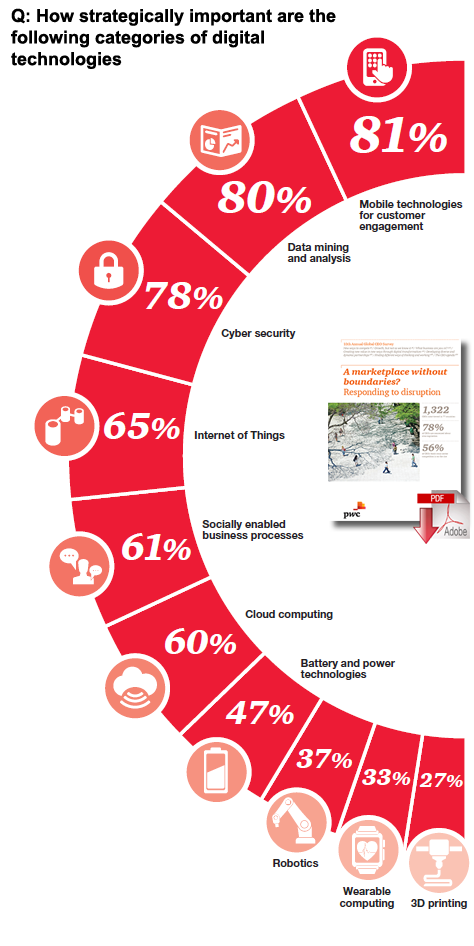Global CEO Survey: Transportation & Logistics CEOs Capitalizing On New Technologies

Transportation & logistics CEOs are clear about the disruptive impact of the forces reshaping their industry landscape and they’re actively exploring new ways to compete, they’re focusing on adopting digital technologies to create value in new ways and developing diverse and dynamic partnerships.
Quiet Confidence
Transportation & logistics CEOs remain fairly upbeat about the economic outlook this year: 41% think the global economy will improve.
That’s a stark contrast to only 17% who expected the economy to improve two years ago, and similar to last year’s results.
This year, half of T&L CEOs are very confident of their revenue growth looking out three years, again holding steady compared to last year.
They believe China, the US and Germany, in that order, offer the best opportunities for growth.
Colliding Trends Causing Upheavals
Of course, transportation & logistics CEOs know that it won’t all be plain sailing. They’re extremely concerned about over-regulation, geopolitical uncertainty and the availability of key skills. Another major topic is, incontestably, energy costs. Despite the decline in the price of oil, T&L CEOs are really concerned about high or volatile energy costs.
Transportation & logistics CEOs are also clear about the way colliding megatrends are disrupting the business landscape. In fact, 58% think changes in regulation and greater direct and indirect competition will impact their organisation over the next five years. They also foresee a shift in consumer spending and customer behaviour (56%) taking a toll.
Creating New Value in New Ways through Digital Transformation
Getting, analysing and using information is key to the current and emerging technologies that CEOs see as most important
The Art of Understanding
CEOs are in no doubt about the role information can play in gaining insight about customers and how to engage with them.
Mobile technologies have been around for decades, but the sheer ubiquity of mobile devices today has revolutionised customers’ ability to obtain information.
The number of mobile phone users globally was expected to total 4.55 billion in 2014 – nearly 70% of the world’s population – with smartphone users totalling 1.75 billion.5 The volume of mobile traffic generated by smartphones is now about twice that of PCs, tablets and routers – despite having only surpassed them in 20136 – and is predicted to grow ten-fold by 2019.7
Access to information has, in turn, transformed how customers perceive value and the type of relationships they want to have with companies.
So it’s understandable that 81% of CEOs see mobile technologies for customer engagement as most strategically important for their organisation – more than any other digital tool. But companies that want to exploit the power of mobile technologies to engage customers face tough choices about how, and how fast, to move to mobile channels and how to integrate those with more traditional channels.
Data analytics, meanwhile, has transformed the ability of companies to access, analyse and circulate information about their customers, and use that information to create the type of relationships that their customers want. Indeed, there’s evidence that companies that can most effectively use analytics to inform demand-side decisions about business processes outperform those that can’t. Small wonder, then, that 80% of CEOs cite data mining and analysis as strategically important.
Entering Adjacent or Entirely New Sectors
Nearly three fifths of all transportation & logistics CEOs anticipate an increasing amount of cross-sector movement, as incumbents from other industries enter adjacent or entirely new areas of business. But they’re not complacent about this threat: 35% of T&L CEOs have already entered a new industry themselves, while another 21% have considered doing so.
Those who are making, or contemplating, a move are primarily targeting the technology, professional and business services and retail and wholesale distribution sectors.
Driving Down The Digital Highway
Transportation & logistics CEOs are also exploring new ways to compete. They see mobile technologies for engaging with customers, cybersecurity tools and data analytics as the three most important areas in which to invest.
The speed at which technology is evolving concerns them a lot more than last year. In our view, some T&L companies have struggled to keep up in the past. But because of the high value it brings to their organisation, many are now embarking on the digital path. T&L CEOs see improvements in operational efficiency, the ability to deliver a better customer experience and a stronger grip on the data they collect as among the top ways digital technologies bring value to their organisation.
However, T&L CEOs stress the fact that maximising the value of the digital investments they’ve made requires a well thought-out plan, including defined measures of success. It also requires a CEO who personally champions the use of digital technologies and a clear understanding of the competitive advantages to be gained.
Diverse Alliances, New Ways of Working
Nearly half of all transportation & logistics CEOs (48%) plan to form a new alliance this year. An alternative to M&A, most aim to partner with customers, suppliers and business networks or trade organisations, mainly to get access to new customers and geographic markets.
49% of transportation & logistics CEOs intend to increase the headcount. Yet, even though skills shortages are a growing cause of concern, almost two fifths of T&L CEOs say their companies are not yet actively searching for talent in different countries, industries or demographic segments.
Source: PwC
Related: Tech Trends 2015: The Fusion of Business and IT

Article Topics
PwC News & Resources
Ranking the Best Countries for Private Business in EMEA Tech Expectations Are Not Matching Reality For Many Companies Drone Technology: Clarity from Above Supply Chain Strategies under the Impact of COVID-19 of Large American Companies Operating in China Supply Chain: Your Brexit Competitive Advantage Digitization and Autonomous Driving to Halve Logistics Costs by 2030, finds PwC Study The Era of Digitized Trucking: Charting Your Transformation to a New Business Model More PwCLatest in Transportation
Talking Supply Chain: Doomsday never arrives for Baltimore bridge collapse impacts Amazon Logistics’ Growth Shakes Up Shipping Industry in 2023 Nissan Channels Tesla With Its Latest Manufacturing Process Why are Diesel Prices Climbing Back Over $4 a Gallon? Luxury Car Brands in Limbo After Chinese Company Violates Labor Laws The Three Biggest Challenges Facing Shippers and Carriers in 2024 Supply Chain Stability Index: “Tremendous Improvement” in 2023 More Transportation














